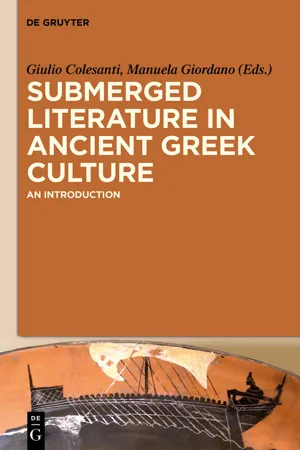
- 239 pages
- English
- ePUB (mobile friendly)
- Available on iOS & Android
An Introduction
About this book
This volume deals with the submerged literature of ancient Greece; that is, all the texts produced for socially relevant events that have contributed to the configuration and articulation of ancient Greek culture as we know it. In particular, the hermeneutic tool of submerged literature may shed new light on the dynamics behind the 'emersion' or 'submersion' of certain texts during different periods. The category of submerged literature is extended here to include preserved and lost texts as well as those texts that can be reconstructed through investigation. The volume investigates the manifold speech acts that we know of through various sources and that, either from the outset or over the course of time, have been placed at the edge of diffusion, conservation and transmission. The essays contained in the volume deal with questions of hermeneutics, philology and methodology, as well as with epic cycles, lyric poetry, tragedy, comedy, satyr drama, and mime. By approaching these genres from the perspective of submerged literature, the book tries to provide a more precise contextualization of the texts within the communication system of ancient Greece. The book thus presents a new line of research and a series of studies that take a fresh look at the texts and all archaeological and iconographic sources relating to Greek culture, taking into account the results of ethnographic and anthropological research. This extensive investigation examines unique ancient Greek orality and literacy dynamics using a new hermeneutic frame that will hopefully reshape our understanding of ancient Greek culture.
Tools to learn more effectively

Saving Books

Keyword Search

Annotating Text

Listen to it instead
Information
Contributors
Dipartimento di Scienze dell’antichità
Piazzale Aldo Moro 5, I-00185 Roma (RM)
e-mail: [email protected]
e-mail: [email protected]
Dipartimento di Studi Umanistici
87036 Arcavacata di Rende (CS)
e-mail: [email protected]
Dipartimento di Scienze umane
Viale Nizza, 14, I-67100 L’Aquila (AQ)
e-mail: [email protected]
Dipartimento di Lettere e Filosofia
Dipartimento di Scienze dell’antichità
Piazzale Aldo Moro 5, I-00185 Roma (RM)
e-mail: [email protected]
Dipartimento Asia, Africa e Mediterraneo
e-mail: [email protected]
Dipartimento di Scienze umane
Viale Nizza 14, I-00167 L’Aquila (AQ)
e-mail: [email protected]
Dipartimento di Scienze dell’antichità
Piazzale Aldo Moro 5, I-00185 Roma (RM)
e-mail: [email protected]
Rossi 2000. On L. E. Rossi as historian of Greek literature see Nicolai 2013.
‘Fare una recensio della letteratura greca mai emersa a livello editoriale (termine improprio per tutto quello che precede il IV sec. a.C.: sarebbe meglio dire ‘a livello di diffusione policentrica’). Tale letteratura non era stata protetta dalla polis o da una qualsiasi autorità – per così dire – istituzionale dal punto di vista letterario. ‘
See Ercolani in this volume.
Namely, Roberto Nicolai, who has succeded Rossi on his chair, Maria Broggiato, Giulio Colesanti, Andrea Ercolani, Manuela Giordano, Laura Lulli, Michele Napolitano, Riccardo Palmisciano, Livio Sbardella, Maurizio Sonnino.
The seminars and the research have been sponsored and promoted by the following academic institutions: ‘Sapienza’ University of Rome, CNR – Istituto di Studi sul Mediterraneo Antico, University of L’Aquila, University of Calabria, University of Cassino and Southern Latium, University of Naples ‘L’Orientale’, University of Tuscia, which we wish to thank for their support.
See Morgan 1998, 90 f., Easterling 2002, 21. On the definition of an independent literary domain see Finkelberg 1998, Ford 2002, and Nicolai forthcoming.
See Ercolani in this volume.
Rossi 2000, 170: ‘Con letteratura ‘sommersa’ io intendo […] testi maltrattati fin dal primissimo inizio della trasmissione, o anche testi che non hanno avuto alcuna trasmissione affatto. Questi testi non hanno goduto di alcun controllo e di alcuna protezione sia perché le varie comunità non avevano alcun interesse a conservarli sia perché avevano, piuttosto, interesse a nasconderli o addirittura a sopprimerli: quest’ultima categoria è rappresentata da quanto era legato ai misteri. Ma molti di questi testi, che dal nostro punto di osservazion...
Table of contents
- Title Page
- Copyright Page
- Dedication
- Acknowledgements
- Contents
- Introductory Notes
- Defining the Indefinable: Greek Submerged Literature and Some Problems of Terminology
- Submerged Literature in an Oral Culture
- The Canon and Its Boundaries
- Beyond the Canon: Hellenistic Scholars and Their Texts
- The Trojan War Myth: Rhapsodic Canon and Lyric Alternatives
- Local Epics and Epic Cycles: the Anomalous Case of a Submerged Genre
- Two Cases of Submerged Monodic Lyric: Sympotic Poetry and Lullabies
- Dramatic Actions from Archaic Iconographic Sources: the Domain of the Satyrikon
- Comedy outside the Canon: from Ritual Slapstick to Hellenistic Mime
- Out of Athens. Ritual Performances, Spaces, and the Emergence of Tragedy
- By Way of Conclusion
- Reference List
- Index Nominum
- Index Rerum Notabilium
- Index Locorum
- Contributors
Frequently asked questions
- Essential is ideal for learners and professionals who enjoy exploring a wide range of subjects. Access the Essential Library with 800,000+ trusted titles and best-sellers across business, personal growth, and the humanities. Includes unlimited reading time and Standard Read Aloud voice.
- Complete: Perfect for advanced learners and researchers needing full, unrestricted access. Unlock 1.4M+ books across hundreds of subjects, including academic and specialized titles. The Complete Plan also includes advanced features like Premium Read Aloud and Research Assistant.
Please note we cannot support devices running on iOS 13 and Android 7 or earlier. Learn more about using the app